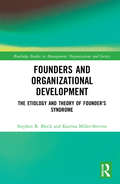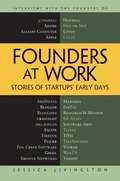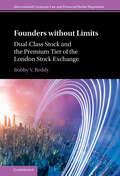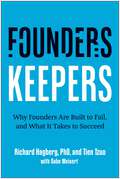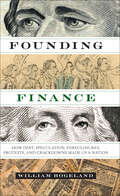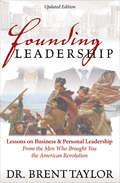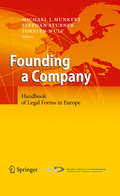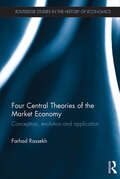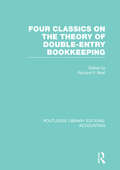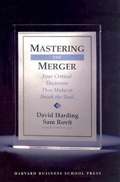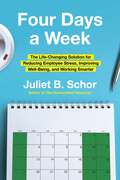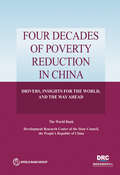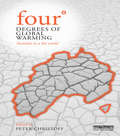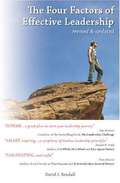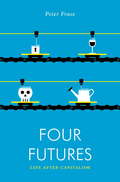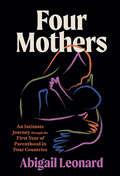- Table View
- List View
Founder-CEO Succession at Wily Technology
by Noam Wasserman Henry MccanceBefore he accepts the new CEO position, Dick Williams wants founder Lew Cirne to step down as chairman. While considering Williams' incredible demand, Cirne reflects on everything he has already given up to get Wily Technology to this point. He agreed to step down as CEO and take what could be a largely symbolic CTO title. He also agreed to give Williams roughly as much equity as he himself owned and far more in salary. As the founder, CEO, and chairman of Wily Technology, Cirne had worked hard to build the skills necessary to lead his start-up. He had developed Wily's early technology single-handedly, had hired 50 employees to help him build his company, and had successfully spearheaded a strategic transformation of his company. He had led Wily to the point where several important customers bought its flagship product and had successfully raised two rounds of financing from top investors. Cirne wonders what he could have done to be pushed to the side like this. What should he do now?
Founders Factory
by James Barnett Jeffrey RayportIn January 2020, Brent Hoberman and Henry Lane Fox, co-founders of Founders Factory, a venture capital fund with an accelerator and incubator program funded by investment from corporate partners, consider international expansion strategies.
Founders and Organizational Development: The Etiology and Theory of Founder's Syndrome (Routledge Studies in Management, Organizations and Society)
by Katrina Miller-Stevens Stephen R. BlockFounders and Organizational Development: The Etiology and Theory of Founder’s Syndrome is designed to help today’s researchers, faculty, students and practitioners become familiar with the etiology and dynamics of Founder’s Syndrome as an organizational condition challenging nonprofit/nongovernmental, social enterprise, and for-profit and publicly traded organizations. The book uses applied social and psychological theories and concepts to peel away the layers of an organizational enigma, revealing three causes of Founder’s Syndrome and insight into the power and privileges assumed by founders who engage in undesirable and self-destructive behaviors leading to their termination; going from hero status to antihero. Researchers, instructors, students, and practitioners will find thought-provoking case studies from the real world of organization development practice. Segments from interviews during interventions reveal the type of emotional turmoil experienced in organizations where founder’s syndrome is present. Insight is provided into accounts of well-known founders who were terminated or forced to resign. The unique features of this book include: integrating theory into practice, describing a new theory about the psychological reaction of founder’s syndrome victims, prevention ideas when designing new organizations, strategies for intervention, using content based on research and organization development consultation experiences, and, integrating feedback from students who have launched organizations.
Founders at Work: Stories of Startups' Early Days
by Jessica LivingstonFounders at Work: Stories of Startups' Early Days is a collection of interviews with founders of famous technology companies about what happened in the very earliest days. These people are celebrities now.
Founders without Limits: Dual-Class Stock and the Premium Tier of the London Stock Exchange (International Corporate Law and Financial Market Regulation)
by Bobby V. ReddyBig Tech has flourished on the US public markets in recent years with numerous blue-chip IPOs, from Google and Facebook, to new kids on the block such as Snap, Zoom, and Airbnb. A key trend is the burgeoning use of dual-class stock. Dual-class stock enables founders to divest of equity and generate finance for growth through an IPO, without losing the control they desire to pursue their long-term, market-disrupting visions. Bobby Reddy scrutinises the global history of dual-class stock, evaluates the conceptual and empirical evidence on dual-class stock, and assesses the approach of the London Stock Exchange and ongoing UK regulatory reforms to dual-class stock. A policy roadmap is presented that optimally supports the adoption of dual-class stock while still protecting against its potential abuses, which will more effectively attract high-growth, innovative companies to the UK equity markets, boost the economy, and unleash the true potential of 'founders without limits'.
Founders, Keepers: Why Founders Are Built to Fail, and What it Takes to Succeed
by Tien Tzuo Richard Hagberg PhDBased on decades of empirical research and data, Founders, Keepers gives founders a practical roadmap for navigating the inevitable challenges that come with startup growth.It&’s a brutal paradox—the same founder attributes required to put a startup in motion will invariably blow it up. The difference between success and failure lies in the personal journey that every founder must pursue to avoid their own worst impulses. Steeped in nearly forty years of research in leadership psychology, Founders, Keepers begins with the same personality assessment Rich Hagberg, a psychologist and executive management coach, gives his clients. Hagberg and Tien Tzuo, founder and CEO of Zuora, help founders build a Swiss Army knife of practical tools that will give them a much better chance of making it to the next level of success. A guide for founders, investors, and academics alike, the result of a decade-long collaboration between a successful CEO and Silicon Valley&’s &“CEO Whisperer&” offers readers insights into: The differentiators between successful and unsuccessful founders The three pillars of leadership that every founder needs to be successful The essential skills founders need to master to be successful over the long haul An examination of the common personality traits that lead founders to make fatally flawed decisions What makes founders tick, including the default tendencies and leadership styles that often undermine their success How founders frustrate their investors, partners and employees Founders may not be able to account for all the complexities of their companies, but they can account for themselves. It&’s a difficult but unavoidable truth: to grow your startup, you have to grow as a person. And that&’s where Founders, Keepers comes in.
Founding Finance: How Debt, Speculation, Foreclosures, Protests, and Crackdowns Made Us a Nation (Discovering America)
by William HogelandThe author of The Whiskey Rebellion “dig[s] beneath history’s surface and note[s] both the populist and anti-populist dimensions of the nation’s founding” (Library Journal).Recent movements such as the Tea Party and anti-tax “constitutional conservatism” lay claim to the finance and taxation ideas of America’s founders, but how much do we really know about the dramatic clashes over finance and economics that marked the founding of America? Dissenting from both right-wing claims and certain liberal preconceptions, Founding Finance brings to life the violent conflicts over economics, class, and finance that played directly, and in many ways ironically, into the hardball politics of forming the nation and ratifying the Constitution—conflicts that still continue to affect our politics, legislation, and debate today.Mixing lively narrative with fresh views of America’s founders, William Hogeland offers a new perspective on America’s economic infancy: foreclosure crises that make our current one look mild; investment bubbles in land and securities that drove rich men to high-risk borrowing and mad displays of ostentation before dropping them into debtors’ prisons; depressions longer and deeper than the great one of the twentieth century; crony mercantilism, war profiteering, and government corruption that undermine any nostalgia for a virtuous early republic; and predatory lending of scarce cash at exorbitant, unregulated rates, which forced people into bankruptcy, landlessness, and working in the factories and on the commercial farms of their creditors. This story exposes and corrects a perpetual historical denial—by movements across the political spectrum—of America’s all-important founding economic clashes, a denial that weakens and cheapens public discourse on American finance just when we need it most.
Founding Finance: How Debt, Speculation, Foreclosures, Protests, and Crackdowns Made Us a Nation (Discovering America)
by William HogelandRecent movements such as the Tea Party and anti-tax “constitutional conservatism” lay claim to the finance and taxation ideas of America’s founders, but how much do we really know about the dramatic clashes over finance and economics that marked the founding of America? Dissenting from both right-wing claims and certain liberal preconceptions, Founding Finance brings to life the violent conflicts over economics, class, and finance that played directly, and in many ways ironically, into the hardball politics of forming the nation and ratifying the Constitution—conflicts that still continue to affect our politics, legislation, and debate today. Mixing lively narrative with fresh views of America’s founders, William Hogeland offers a new perspective on America’s economic infancy: foreclosure crises that make our current one look mild; investment bubbles in land and securities that drove rich men to high-risk borrowing and mad displays of ostentation before dropping them into debtors’ prisons; depressions longer and deeper than the great one of the twentieth century; crony mercantilism, war profiteering, and government corruption that undermine any nostalgia for a virtuous early republic; and predatory lending of scarce cash at exorbitant, unregulated rates, which forced people into bankruptcy, landlessness, and working in the factories and on the commercial farms of their creditors. This story exposes and corrects a perpetual historical denial—by movements across the political spectrum—of America’s all-important founding economic clashes, a denial that weakens and cheapens public discourse on American finance just when we need it most.
Founding Leadership: Lessons on Business & Personal Leadership From the Men Who Brought You the American Revolution
by Dr. Brent TaylorWhat would Washington (or Jefferson or Hamilton) do? Practical leadership lessons from the eighteenth century that you can use today. To many, the leaders of the American Revolution are distant men of myth—stoic, heroic, and unknowable. People take for granted that these men were brilliant, but rarely ask why. What distinguished them from their fellow citizens, both then and now? What can they teach about leadership, and about realizing both career and personal goals? Founding Leadership reveals the human side of these &“marble men,&” examining the words, deeds, and personal qualities that allowed Washington, Jefferson, Adams, Hamilton, and others to achieve their utopian aims. Historian Brent Taylor demonstrates that effective leadership requires more than perseverance and a laundry list of how-to steps. It requires leaders to conceive visions greater than themselves, then communicate those visions in ways that inspire, persuade, and motivate others. In examining historical episodes both famous and obscure, Taylor uncovers the light and dark sides of power, including the motivations behind Benedict Arnold&’s infamous betrayal. Through these fascinating studies, you can become more attuned to America&’s past and—most importantly—to your own leadership potential.
Founding a Company
by Michael J. Munkert Torsten Wulf Stephan StubnerThe book "Founding a Company - Handbook of Legal Forms in Europe" provides an easily accessible overview of the most important information any entrepreneur or manager needs when deciding for a legal form of the business. This makes it especially interesting for companies that decide to enter new markets within Europe and need to understand which requirements and advantages the different legal forms have. With the structured presentation of this information for ten different countries the book allows for quick comprehension and comparison of the aspects discussed. The book is a valuable resource for entrepreneurs, consultants and anybody who supports the business formation process in Europe as well as for lecturers and students working in this field.
Fountain House: Creating Community in Mental Health Practice
by Julius Lanoil Kenneth Dudek Alan DoyleOften people with mental illness feel alone in society, with no place to go and little hope. Their isolation can be further perpetuated through typical approaches to treatment, such as case management and psychotherapy.Since 1948, the Fountain House "working community" has worked to address the isolation and social stigmatization faced by people with mental illness. This volume describes in detail its evidence-based, cost-effective, and replicable model, which produces substantive outcomes in employment, schooling, housing, and general wellness. Through an emphasis on personal choice, professional and patient collaboration, and, most important, "the need to be needed," Fountain House demonstrates that people with serious mental illness can not only live but also contribute and thrive in society.The authors also explore the evolution of Fountain House practice, which is grounded in social work and psychiatry and informs current strength-based and recovery methodologies. Its inherent humanity, social inclusivity, message of personal empowerment, and innovation—a unique approach on behalf of people suffering from mental illness—have led to the paradigm's worldwide adoption.
Four Arguments for the Elimination of Television
by Jerry Mander“Persuasive . . . interesting and unusual.” —Kirkus ReviewsA total departure from previous writing about television, this book is the first ever to advocate that the medium is not reformable. Its problems are inherent in the technology itself and are so dangerous—to personal health and sanity, to the environment, and to democratic processes—that TV ought to be eliminated forever.Weaving personal experiences with meticulous research, the author ranges widely over aspects of television that have rarely been examined and never before joined together, allowing an entirely new, frightening image to emerge. The idea that all technologies are neutral, benign instruments that can be used well or badly is thrown open to profound doubt. Speaking of TV reform is, in the words of the author, “as absurd as speaking of the reform of a technology such as guns.”Praise for the work of Jerry Mander“Lively, provocative.” —Publishers Weekly“A skilled writer.” —Kirkus Reviews (starred review)
Four Central Theories of the Market Economy: Conception, evolution and application (Routledge Studies in the History of Economics)
by Farhad RassekhThis highly original work offers an intellectual history of four central theories underlying the market economic system, focusing on their conception, evolution, and applications. Four Central Theories of the Market Economy traces the root of the theories, their conception and articulation, as well as their evolutions to the present time. It focuses on the four theories that are generally recognized as fundamental to the discipline of economics: the invisible hand, comparative advantage, the law of markets, and the quantity theory of money. These theories have profoundly influenced the world. Chapters explore their rich intellectual history from classical Greece to today, drawing on the original works of the great economic minds of the classical era and other thinkers who prepared the path for them, as well as those who refined their works or challenged them. This volume will leave the reader with a deep understanding of these pillars of the market economic system in the context of their historical development. This book will be of great interest to all scholars and students of economics who are interested in the intellectual history of their discipline as well as scholars and students of intellectual history who are interested in economics.
Four Classics on the Theory of Double-Entry Bookkeeping (Routledge Library Editions: Accounting)
by Richard P. BriefAlthough each of the pieces included in this collection has been cited as an outstanding contribution to the literature on the subject, they are not available in most libraries. Each of them is a classic on the theory of double-entry bookkeeping. Of the nine articles reprinted in this volume originally published in 1984, those by Ladelle, Hotelling and Anton are recognized as being the classic articles on the depreciation of a single ‘machine’. Each of these articles was published in a journal that is often not accessible and reprinted here has brought them together in one place. For many years accountants have dealt with depreciation and capital maintenance as a static problem. This volume recognizes its dynamic aspects.
Four Critical Decisions That Make or Break the Deal: Mastering the Merger
by David Harding Sam RovitUltimately, the success or failure of a merger grows out of the decisions made by executives at critical junctures throughout the transaction. Using the case of Kellogg, this chapter illustrates that the better people are at handling the four imperatives of a business combination, the more successful the merger is likely to be.
Four Days a Week: The Life-Changing Solution for Reducing Employee Stress, Improving Well-Being, and Working Smarter
by Juliet Schor ProfessorBestselling author, leading sociologist and economist Juliet Schor makes the case for a four-day work week, persuasively showing how this model can address major challenges such as burnout, AI and the climate crisis, and how employees, companies, and governments can work together to make it a reality. Around the world, long hours and intense pressure are taking their toll. When the pandemic hit in 2020, work-induced stress and burnout skyrocketed. Many reached a breaking point. Now, three-quarters of the world’s employees are disengaged and struggling, including in the US and Canada, where half are experiencing high levels of daily stress.Our current work culture ,the five-day, forty-hours-a-week model—which has gone unchanged for nearly a century—is failing. But a remedial countertrend has emerged: the four-day work week. Kickstarter, Bolt, Basecamp, ThredUp, and hundreds of other employers have eliminated the fifth day of work, successfully figuring out how to maintain productivity while seeing remarkable improvements in employee well-being. Hiring is easier and fewer people are quitting. These results are global. Working a four-day week, people feel energized, capable, and more optimistic about their lives—and their jobs.Four Days a Week is the first large-scale study of this trend. Juliet Schor—an expert who has researched and written about work for more than four decades, beginning with her New York Times bestseller The Overworked American in 1992—shares her pioneering analysis of the benefits of a shorter work week, how companies can achieve them, why the concept has taken so long to emerge and gain acceptance, and why doing so will help a company’s employees and its bottom line. The book is a blueprint for implementing a change that once seemed radical, but is now within reach.
Four Decades of Poverty Reduction in China: Drivers, Insights for the World, and the Way Ahead
by World Bank;Development Research Center of the State Council, the People's Republic of ChinaRegardless of the poverty line used, the speed and scale of China’s poverty reduction is historically unprecedented. Over the past 40 years, the number of people in China with incomes below US$1.90 per day—the international poverty line as defined by the World Bank to track global extreme poverty—has fallen by close to 800 million, accounting for almost three-quarters of the global reduction in extreme poverty. In 2021, China declared that it had eradicated extreme poverty according to its national poverty threshold, and that it had built a “moderately prosperous society in all respects.†? However, a significant number of people remain vulnerable, with incomes below a threshold more typically used to define poverty in upper-middle-income countries. China has set a new goal of approaching common prosperity by 2035, which can help keep the policy focus on the vulnerable population. Four Decades of Poverty Reduction in China: Drivers, Insights for the World, and the Way Ahead explores the key drivers of China’s poverty alleviation achievements and considers the lessons of China’s experience for other developing countries. The report also makes suggestions for China’s future policies. China’s approach to poverty reduction was based on two pillars. The first aimed for broad-based economic transformation to open new economic opportunities and raise average incomes. The second was the recognition that targeted support was needed to alleviate persistent poverty; this support was initially provided to disadvantaged areas and later to individual households. The success of China’s economic development and the associated reduction of poverty also benefited from effective governance, which helped coordinate multiple government agencies and induce cooperation from nongovernment stakeholders. To illustrate the role of broad-based economic transformation for poverty alleviation, separate sections of the report analyze growing agricultural productivity, incremental industrialization, managed urbanization and rural-to-urban migration, and the role of infrastructure.
Four Degrees of Global Warming: Australia in a Hot World
by Peter ChristoffAt Copenhagen in December 2009, the international community agreed to limit global warming to below two degrees Celsius to avoid the worst impacts of human-induced climate change. However climate scientists agree that current national emissions targets collectively will still not achieve this goal. Instead, the ‘ambition gap’ between climate science and climate policy is likely to lead to average global warming of around four degrees Celsius by or before 2100. If a ‘Four Degree World’ is the de facto goal of policy, we urgently need to understand what this world might look like. Four Degrees of Global Warming: Australia in a Hot World outlines the expected consequences of this world for Australia and its region. Its contributors include many of Australia’s most eminent and internationally recognized climate scientists, climate policy makers and policy analysts. They provide an accessible, detailed, dramatic, and disturbing examination of the likely impacts of a Four Degree World on Australia’s social, economic and ecological systems. The book offers policy makers, politicians, students, and anyone interested climate change, access to the most recent research on potential Australian impacts of global warming, and possible responses.
Four Faces of Mass Customization
by James H. Gilmore B. Joseph Pine IIVirtually all executives today recognize the need to provide outstanding service to customers. Focusing on the customer, however, is both an imperative and a potential curse. Companies around the world have embraced mass customization in an attempt to avoid pitfalls. But many managers have discovered that mass customization itself can produce unnecessary cost and complexity. They are realizing that they did not examine thoroughly enough what kind of customization their customers would value before they plunged ahead. In this article, the authors provide a framework to help managers determine the type of customization they should pursue.
Four Factors of Effective Leadership: Revised & Updated
by David RendallThis book combines the wisdom of ancient philosophers, successful executives and leadership gurus into a clear roadmap for leadership success. Using stories of famous leaders and infamous failures, the author illustrates the importance of the four factors: Influence, Integrity, Inspiration, and Improvement. These factors are contrasted with the pitfalls of ineffective leadership: Power, Position, Popularity, and Personality.
Four Futures: Life After Capitalism (Jacobin)
by Peter FraseCapitalism is going to endPeter Frase argues that increasing automation and a growing scarcity of resources, thanks to climate change, will bring it all tumbling down. In Four Futures, Frase imagines how this post-capitalist world might look, deploying the tools of both social science and speculative fiction to explore what communism, rentism, socialism and exterminism might actually entail.Could the current rise of real-life robocops usher in a world that resembles Ender's Game? And sure, communism will bring an end to material scarcities and inequalities of wealth--but there's no guarantee that social hierarchies, governed by an economy of "likes," wouldn't rise to take their place. A whirlwind tour through science fiction, social theory and the new technologies already shaping our lives, Four Futures is a balance sheet of the socialisms we may reach if a resurgent Left is successful, and the barbarisms we may be consigned to if those movements fail.From the Trade Paperback edition.
Four Green Houses and a Red Hotel: New strategies for creating wealth through property
by Pete WargentFour Green Houses, and a Red Hotel provides new and experienced investors with a specific state by state guide to the best property investments for future wealth. Successful investment often mirrors a game of Monopoly – winners keep their expenses low and continue to acquire prime investments over time. Financial expert and author Pete Wargent, provides simple and effective strategies for acquiring wealth through property and a holistic financial plan, which includes share investment. The economic instability since the financial crisis and the volatility of investment markets have made investment a daunting prospect for many Australians. With interest rates cut to record lows, consumer confidence is growing and investors are coming back to the market in droves; albeit with a thirst for information on new property strategies and markets. Four Green Houses, and a Red Hotel is an up-to-date look at each of the capital cities in Australia and the best investments in property and shares in each state.
Four Key Concepts: Your Starting Points
by Harvard Business Review PressAny successful negotiation must have a fundamental framework based on four key concepts: BATNA (best alternative to negotiated agreement), reservation price, ZOPA (zone of possible agreement), and value creation through trade. This chapter develops these four concepts with examples that help you become a skilled negotiator.
Four Mothers: An Intimate Journey through the First Year of Parenthood in Four Countries
by Abigail LeonardAbigail Leonard's page-turning narrative of four real women—Anna from Finland, Tsukasa from Japan, Sarah from the U.S., and Chelsea from Kenya—is a "deeply personal look at women worldwide grappling with the best and worst moments of their first year... eye-opening and cathartic, this is a love letter to parents and a clarion call for better policy.&” (Eve Rodsky, New York Times-bestselling author of Fair Play) Tsukasa in Japan grapples with memories of a difficult childhood as she tries to chart a new, healthier path for her own daughter while balancing onerous cultural expectations. Chelsea in Kenya endures a devastating loss just before she gives birth and finds that without the traditional support of previous generations, motherhood can be grueling – but it can also provide emotional healing. Anna in Finland navigates a complicated relationship with her child&’s father, but the country&’s robust family policies allow her to still pursue the kind of parenthood that she envisioned. Sarah in the US leaves the religious community that raised her in order to create a less traditional family of her own only to find she&’s largely confronting motherhood alone. Utterly moving and propulsively readable from page one, Leonard interweaves these stories with a critically researched exploration of how parental support programs evolved in each country—and why some provide more help than others. As nations around the world debate programs like paid leave, universal daycare, reproductive healthcare, and family tax incentives, Four Mothers offers a uniquely intimate, moving portrait of what those policies mean for parents on the ground—and considers what modern families really want.

